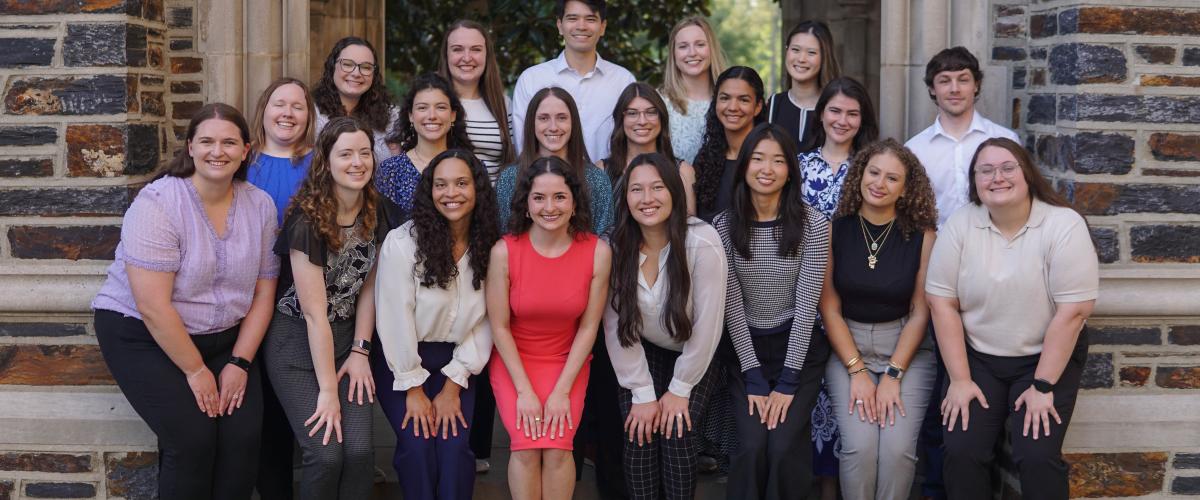
Welcome
Thank you for your interest in our ASHP-Accredited PGY1 Residency. For over 50 years our program has been training residents to become confident and highly skilled practitioners equipped with the knowledge and abilities to meet the challenges facing pharmacy practice both now and in the future. We measure our success each year through the ability of our graduates to obtain the most competitive specialty residencies, fellowships, academic, and clinical positions available. Our commitment to continued excellence guarantees that our program will only strengthen in the future. The residency selection process is an important professional decision, and an investment that will reap rewards for many years to come. We are pleased that you are interested in the Duke PGY1 Residency and hope that you complete an application to our program.
General Information
PGY1 residency programs build upon Doctor of Pharmacy (PharmD) education and outcomes to develop pharmacist practitioners with knowledge, skills, and abilities as defined in the educational competency areas, goals, and objectives. Residents who successfully complete PGY1 residency programs will be skilled in diverse patient care, practice management, leadership, and education, and be prepared to provide patient care, seek board certification in pharmacotherapy (i.e., BCPS), and pursue advanced education and training opportunities including postgraduate year two (PGY2) residencies.
Pharmacists completing the PGY1 training at Duke will be prepared to participate as an essential member of an interdisciplinary team assuming responsibility for the medication related aspects of patient care, including academic medical centers and community hospitals.
Excellence will be achieved by:
• Demonstrating accountability for patient care
• Modeling excellence in pharmaceutical care and pharmacy operations
• Serving as professional role models for pharmacy students
• Participating in clinical research and performance improvement projects
Outcomes
A resident specific customized plan will be created with aid from the residency program director based on the resident’s prior experience and interests. This will guide the development and achievement of an individualized set of goals and educational outcomes.
Required Outcomes
R1.1 Provide safe and effective patient care services following JCPP (Pharmacists’ Patient Care Process)
R1.2: Provide patient-centered care through interacting and facilitating effective communication with patients, caregivers, and stakeholders
R1.3 Promote safe and effective access to medication therapy
R1.4 Participate in the identification and implementation of medication-related interventions for a patient population (population health management)
R2.1 Conduct practice advancement projects
R3.1 Demonstrate leadership skills that contribute to departmental and/or organizational excellence in the advancement of pharmacy services
R3.2 Demonstrate leadership skills that foster personal growth and professional engagement.
R4.1 Provide effective medication and practice-related education
R4.2 Provide professional and practice-related training to meet learners’ educational needs.
Residency Experience
Residents begin the year with one month of orientation. Orientation consists of clinical and operational staffing training and an introduction to different requirements of the program such as noon conference and the research process. Rotational learning experiences are organized by calendar month.
Additional residency activities include involvement in the education of healthcare providers, participation in journal clubs, participation in grand rounds, participation on a formulary evaluation team, completion of a medication use evaluation, and development and completion of a research protocol.
For more information about our hospital and program structure view our PGY1 Calendar.
Program Leadership
Brianna Alexander, serves as the Director of the Duke University Hospital PGY1 Residency. A PGY1 Residency Advisory Committee provides support and serve as advocates for the residents and help review progress of the residents and support change as needed. There is a Program Coordinator assigned to each resident to help develop their customized plan for the year and to provide feedback and guide the resident’s plan to meet established goals and objectives.
Learning Experiences
For a detailed list of PGY1 rotations, view our Rotations page.
Application Information
Applications for the PGY1 Pharmacy Practice Residency are due January 2nd. For more information, please visit our Application Information page on the left sidebar or feel free to email one of the current PGY1 residents.